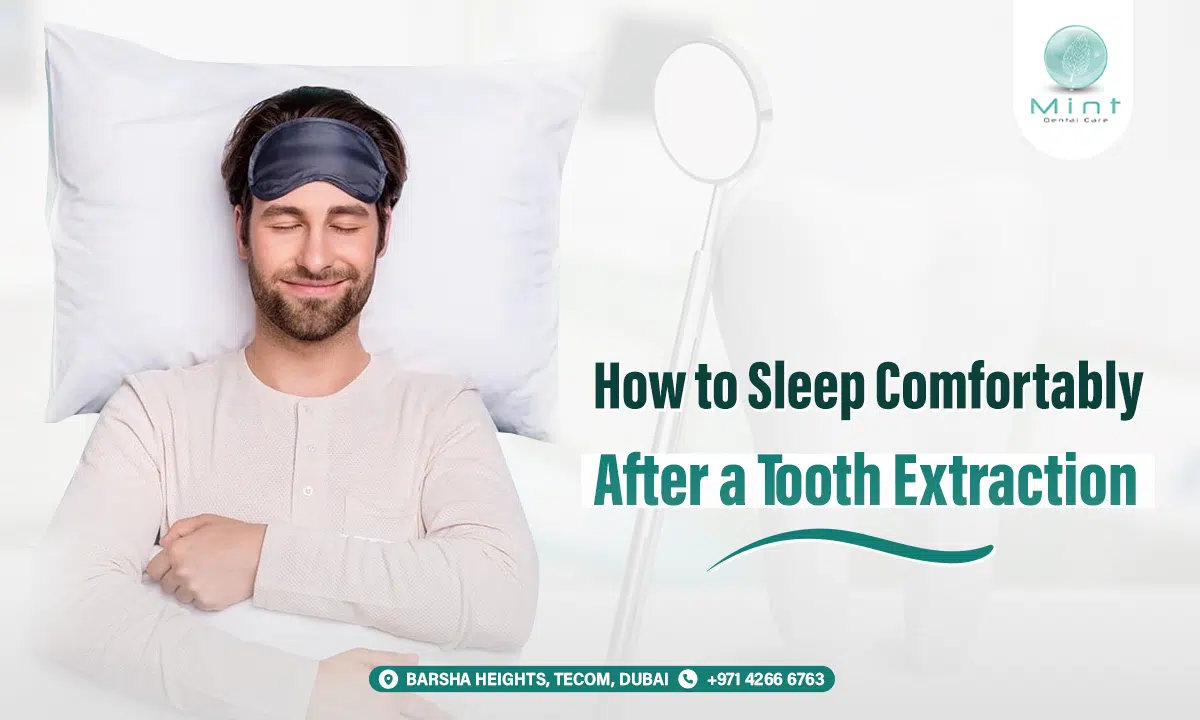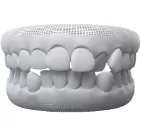Tooth extraction is a common dental procedure, but the recovery process can be uncomfortable, especially when trying to sleep. Many patients experience pain, swelling, and bleeding after the extraction, making it difficult to rest properly. A good night’s sleep is essential for healing, as it allows the body to recover and reduces the risk of complications.
Following the right post-extraction care and sleeping in the correct position can help minimize discomfort and promote faster healing. Simple adjustments, such as using extra pillows for support and avoiding certain sleeping habits, can make a significant difference in recovery. Understanding how to sleep properly after a tooth extraction ensures a smooth and pain-free healing process.
Why Sleeping Position Matters After a Tooth Extraction
The way you sleep after a tooth extraction can affect blood circulation, swelling, and pain levels. Lying flat immediately after the procedure can cause increased blood flow to the extraction site, which may lead to prolonged bleeding and discomfort. Keeping your head elevated helps reduce swelling and allows the blood clot to form properly, preventing complications such as dry socket.
Sleeping in the wrong position can also put pressure on the affected side of the mouth, leading to irritation and delayed healing. Proper posture and support during sleep can significantly reduce discomfort and promote faster recovery. Making small adjustments to your sleeping position will help you feel more comfortable and prevent unnecessary pain.
Best Sleeping Position After a Tooth Extraction
The best way to sleep after a tooth extraction is on your back with your head elevated using pillows. Keeping your head at a slightly higher position than your body helps reduce swelling and bleeding, allowing the extraction site to heal properly. Using two or three pillows for support can help maintain this position throughout the night.
Patients who are used to sleeping on their side should try to avoid resting on the side of the extraction. Sleeping on the affected side can increase pressure on the wound, dislodge the blood clot, and cause unnecessary pain. Training yourself to sleep on your back for a few nights after the extraction will ensure a smoother healing process.
How to Reduce Pain and Swelling Before Bed
Managing pain and swelling before bedtime is essential for a comfortable night’s sleep. Taking prescribed pain relievers or over-the-counter medications, as recommended by your dentist, can help reduce discomfort. It is best to take the medication at least 30 minutes before going to bed to allow it to take effect.
Applying a cold compress or ice pack to the cheek near the extraction site can help minimize swelling and numb the area. Ice packs should be applied in 15-minute intervals, with breaks in between, to prevent skin irritation. Reducing swelling before bedtime helps prevent excessive discomfort and makes it easier to fall asleep.
Avoid Sleeping on the Extraction Side
Sleeping on the side of the extraction site can put unnecessary pressure on the wound, leading to pain and irritation. If the blood clot becomes dislodged, it can cause dry socket, a painful condition that exposes the bone and nerves. To prevent this, try using a body pillow or extra cushions to keep yourself from rolling onto the affected side during sleep.
If you are someone who naturally turns in their sleep, placing a pillow behind your back can help maintain a stable position. Keeping your head elevated and avoiding direct pressure on the extraction site will significantly improve comfort and healing. Being mindful of your sleeping position is crucial for avoiding complications.
Stay Hydrated But Avoid Drinking Before Bed
Staying hydrated is important for overall healing, but it is best to limit drinking fluids right before bedtime. Drinking too much water before sleep may lead to frequent trips to the bathroom, disrupting rest. Additionally, using a straw should be avoided, as the suction can disturb the blood clot and increase the risk of dry socket.
Sipping water slowly throughout the day helps keep the mouth moist and prevents dehydration. Rinsing the mouth with salt water, as recommended by your dentist, can help reduce bacteria and promote healing. Avoiding alcohol and caffeinated drinks before bed will also help maintain a good sleep cycle and reduce discomfort.
Eating Soft Foods Before Bedtime
Eating the right foods before bedtime can help prevent nighttime hunger and discomfort while sleeping. Soft foods such as yogurt, mashed potatoes, and smoothies are gentle on the extraction site and provide essential nutrients for healing. It is important to avoid hot, spicy, or crunchy foods, as they can cause irritation and increase sensitivity.
Chewing should be done on the opposite side of the mouth to prevent disturbing the extraction site. Giving yourself enough time to eat and digest food before lying down can reduce the risk of acid reflux, which can be uncomfortable after an extraction. Sticking to nutrient-rich, soft foods will support healing and keep discomfort to a minimum.
Maintaining Good Oral Hygiene Before Sleep
Keeping the mouth clean after a tooth extraction is essential for preventing infection and promoting healing. However, brushing too aggressively or rinsing forcefully can disturb the healing process. Dentists usually recommend avoiding direct brushing on the extraction site for the first 24 hours to allow the blood clot to stabilize.
Using a soft-bristled toothbrush and gently cleaning around the area can help maintain oral hygiene without causing irritation. After the first day, a warm salt water rinse can be used to keep the mouth free of bacteria and debris. Following proper oral hygiene practices before bedtime ensures a clean and healthy healing environment.
How Long Should You Follow These Sleeping Tips?
Most patients can return to their normal sleeping habits within three to five days after extraction, depending on how well they heal. For those who experience continued pain or swelling, it may take a little longer to fully recover. It is important to listen to your body and follow your dentist’s aftercare instructions closely.
If pain persists for more than a week, or if there are signs of infection such as persistent swelling, fever, or pus, seeking professional help is necessary. Every patient heals at a different rate, and taking the right precautions can make a significant difference in recovery time. Following these sleeping tips for the first few nights will ensure a smooth and pain-free healing process.
When to Contact Your Dentist
While mild discomfort is normal after a tooth extraction, certain symptoms may indicate complications that require immediate attention. Severe pain that does not improve with medication, excessive bleeding, or a foul taste in the mouth could be signs of infection or dry socket. Contacting your dentist as soon as possible can prevent further issues and ensure proper healing.
Swelling that continues to increase after a few days may also indicate a problem that needs to be addressed. Regular follow-up appointments with your dentist allow them to monitor your progress and provide additional care if needed. Seeking professional advice early on will prevent unnecessary complications and promote a faster recovery.
Why Proper Sleep Matters for Healing
Getting enough rest is essential for the body’s natural healing process, as sleep helps reduce inflammation and supports tissue repair. Poor sleep quality can slow down recovery and increase sensitivity to pain. Creating a comfortable sleeping environment and following proper aftercare instructions will make a significant difference in the healing experience.
Avoiding distractions such as bright lights and loud noises before bedtime can help the body relax and prepare for rest. Taking deep breaths and practicing relaxation techniques can also ease discomfort and improve sleep quality. Prioritizing good sleep habits after a tooth extraction allows for a quicker and smoother recovery.
Schedule a Follow-Up Appointment at Mint Dental Care
If you have recently undergone a tooth extraction and need professional aftercare guidance, Mint Dental Care in Dubai offers expert post-extraction support. Our experienced dentists provide personalized care to ensure a comfortable and successful recovery. Whether you have concerns about healing or need additional treatment, our team is here to help.
Getting the right post-extraction care will ensure that you heal properly and avoid complications. If you have any questions or need further assistance, schedule a follow-up appointment today. Our goal is to provide you with the best dental care and help you achieve a pain-free and healthy smile.















